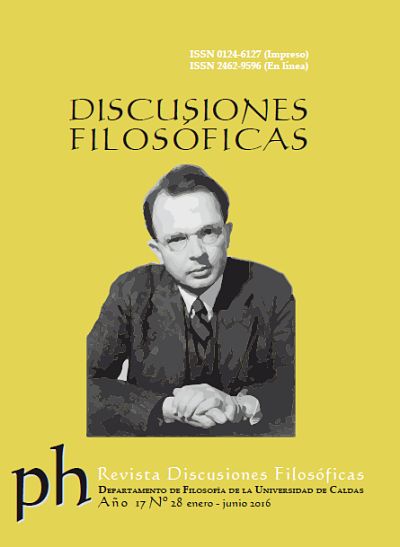Autores/as
Resumen
En este artículo postulamos que el trabajo de Kuhn es una revolución filosófica para la filosofía de la ciencia. La búsqueda de revoluciones filosóficas es una extensión de las ideas de Kuhn acerca de las revoluciones científicas. Las revoluciones filosóficas se distinguen de las revoluciones científicas en algunos aspectos que discutimos en este trabajo. Defendemos que la revolución kuhniana consiste en la naturalización de la filosofía de la ciencia que se desprende de sus trabajos y discutimos la analogía biológica que Kuhn empleó como un ejemplo ilustrativo.
Citas
Barlas, Yaman. “Comments on ‘On the very idea of a system dynamics model of Kuhnian science’”. System Dynamics Review. Winter 8(1), 1992: 43-47. Impreso.
Bird, Alexander. “The Kuhn’s wrong turning”. Studies in History and Philosophy of Science. 33, 2002: 443-463. Impreso.
___. “Naturalizing Kuhn”. Proceedings of the Aristotelian Society. Jun. 2005: 99-117. Impreso.
___. “La filosofía de la historia de la ciencia de Thomas Kuhn”. Discusiones Filosóficas. Jul. 13(21), 2012(a): 167-185. Impreso.
___. “Kuhn, Naturalism and the Social Study of Science”. Kuhn’s The Structure of Scientific Revolutions Revisited. New York: Taylor & Francis, 2012(b). Impreso.
Bornholdt, S.; Jensen, M.H.; Sneppen, K. “Emergence and Decline of Scientific Paradigms”. Physical Review Letters. 106, 2011:058701. Impreso.
Chae, Huiseung; Yook, Soon-Hyung; Kim, Yup. “Phase Transitions in Paradigm Shift Models”. PLoS ONE. 8, 2013: e70928. Impreso.
Chang, Hasok. “Incommensurability: Revisiting the Chemical Revolution”. Kuhn’s The Structure of Scientific Revolutions Revisited. New York: Taylor & Francis, 2012: 153-177. Impreso.
De Langhe, Rogier. “The Kuhnian Paradigm”. Topoi - An International Review of Philosophy. 32, 2013: 65- 73. Impreso.
___. “A comparison of two models of scientific progress”. Studies in History and Philosophy of Science. 46, 2014: 94-99. Impreso.
Hoyningen-Huene, Paul. “Thomas Kuhn and the chemical revolution”. Foundations of Chemistry. 10(2), 2008: 101-115. Impreso.
Jogalekar, Ashutosh. “Chemistry and Biology: Kuhnian or Galisonian?” The curious wave function. Scientific American Blog Network. 2012. Consultado: Sep 18, 2015. Online. http://blogs.scientificamerican.com/the-curious-wavefunction/chemistry-galisonian-rather-than-kuhnian/Jones, Keith. “Is Kuhn a sociologist?”. The British Journal of Philosophy of Science. 37, 1986: 443-452. Impreso
Kuhn, Thomas S. La estructura de las revoluciones científicas. México: Fondo de Cultura Económica, 2013. Impreso.
___. The road since structure: philosophical essays, 1970-1993, with an autobiographical interview. Chicago: University of Chicago Press, 2000. Impreso.
Kuukkanen, Jouni-Matti. “Revolution as Evolution. The concept of evolution in Kuhn’s philosophy”. Kuhn’s The Structure of Scientific Revolutions Revisited. New York: Taylor & Francis, 2012: 134-152. Impreso.
Mauskopf, Seymour H. “Thomas S. Kuhn and the Chemical Revolution”. Historical Studies in the Natural Sciences. 42(5), 2012: 551-556. Impreso.
Mayr, Ernst. “Do Thomas Kuhn’s scientific revolution take place”. What Makes Biology Unique? Considerations on the Autonomy of a Scientific Discipline. USA: Cambridge University Press, 2004: 159-170. Impreso.
___. “The Nature of the Darwinian Revolution”. Science. 176 (4038), 1972: 981-989. Impreso.
Radzicki, Michael. “Reflections on ‘On the very idea of a system dynamics model of Kuhnian science’”. System Dynamics Review. Winter 8(1), 1992: 49-53. Impreso.
Reichenbach, Hans. Experience and Prediction: An analysis of the Foundations and the Structure of Knowledge. Chicago: University of Chicago Press, 1938. Impreso.
Renzi, Barbara. “Kuhn’s Evolutionary Epistemology and Its Being Undermined by Inadequate Biological Concepts”. Philosophy of Science. 76 (2), 2009:143-159. Impreso.
Reydon, Thomas; Hoyningen-Huene, Paul. “Discussion: Kuhn’s Evolutionary Analogy in The Structure of Scientific Revolutions and The Road Since Structure”. Philosophy of Science. 77(3), 2010: 468-476. Impreso.
Ruse, Michael. “Was there a Darwinian Revolution? Yes, no, and maybe!” Endeavour. 38(3-4), 2014: 159-168. Impreso.
___. “The Darwinian revolution: Rethinking its meaning and significance”. Proceedings of the National Academy of Sciences of the United States of America. 106, 2009: 10040-10047. Impreso.
Sánchez Vázquez, Adolfo. “Las revoluciones filosóficas: de Kant a Marx”. Filosofía y circunstancias. Rubí (Barcelona): Anthropos; México: Facultad de Filosofía y Letras, UNAM, 1997. Impreso.
Sterman, John D. “The growth of knowledge: Testing a theory of scientific revolutions with a formal model”. Technological Forecasting and Social Change. 28(2), 1985: 93-122. Impreso.
___. “Response to ‘On the very idea of a system dynamics model of Kuhnian science’”. System Dynamics Review. Winter 8(1), 1992: 35-42. Impreso.
Sterman, John D.; Wittenberg, Jason. “Competition and Succession in the Dynamics of Scientific Revolutions”. Proceedings of the International System Dynamics Conference. Cancun: Monterey Institute of Technology, 1993. Impreso.
Wittenberg, Jason. “On the very idea of a system dynamics model of Kuhnian science”. System Dynamics Review. Winter 8(1), 1992: 21-33. Impreso.
Wittenberg, Jason; Sterman, John D. “Path Dependence, Competition, and Succession in the Dynamics of Scientific Revolution”. Organization Science. May. 10(3), 1999: 322-341. Impreso.
Wray, K. Brad. “Is Science Really a Young Man’s Game?” Social Studies of Science. 33(1), 2003: 137-149. Impreso.
___. Kuhn’s evolutionary social epistemology. Cambridge, UK: Cambridge University Press, 2011. Impreso.
___. “Assessing the influence of Kuhn’s Structure of Scientific Revolutions”. Metascience. 21, 2012: 1-10. Impreso.

 pdf
pdf
 FLIP
FLIP

























